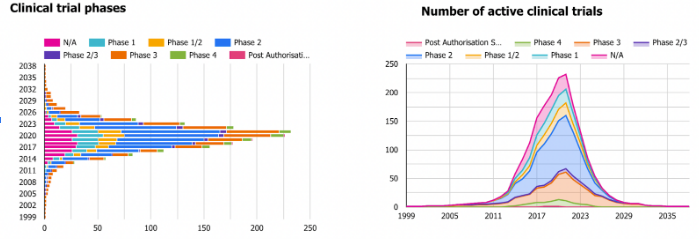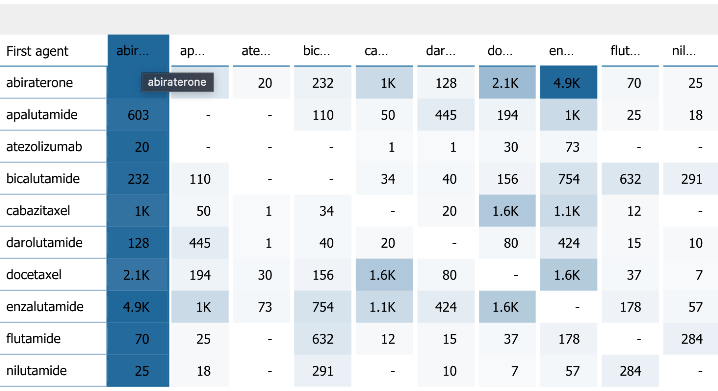Finding the right drug combinations, particularly in oncology, can be very complex. Clinicians want to prescribe with the knowledge that the combinations they are recommending offer the best therapeutic outcomes and are well tolerated. But, it’s a challenge to keep track of the ever-evolving literature landscape…
The range and scope of oncology treatments is developing constantly, which is good news for the fight against cancer, but not always helpful for clinicians trying desperately to keep track of these changes. A key challenge for them is that the combinations of drugs and how they are used with patients are complex as well as fast-moving – they have to find the right drugs that offer both the best therapeutic outcome but with minimal side effects.
A Dimensions and Pfizer solution: Combining artificial and human intelligence to help drug treatments for prostate cancer
The public face of prostate cancer is often portrayed as the battle to educate and encourage men to get themselves checked out. But what happens to those patients who are diagnosed and need to go through the wide variety of drug treatments available – how are the right combinations of drugs for their treatment decided on?
With so many drugs and treatments now available, choosing the right drug combination for patients can be a huge challenge for clinicians. As such, any resource that can help expedite decision-making and knowledge of drug combinations can be especially valuable.
This is where Dimensions, on behalf of Pfizer, developed a prostate cancer agent combinations dashboard
The dashboard is a freely available tool that uses the application of AI to identify relevant publications in relation to all identifiable prostate cancer drug combinations. Clinicians can base their prescriptions on all the relevant data available; that data is constantly updated, powered by the Dimensions database of over 127m publications and 695,000 clinical trials.
Supporting prostate cancer research
Since early 2021, the Dimensions team has created three public and 20 internal dashboards for one of its major customers, Pfizer. The prostate cancer dashboard was created to include publications and clinical trials data specifically on prostate cancer and drug combinations and/or sequences, so that more information is available to help clinicians keep track of the literature published in their field in order to treat their patients as effectively as possible.
The greater the sharing of research data, the greater the impact on patient care and positive outcomes in the fight against prostate cancer.

Doubling down on published research
So, how can a greater impact be made on clinical outcomes from research that has already been published? With Dimensions it can machine read existing publications so the clinician doesn’t have to do the impossible, which is to somehow keep abreast of the hundreds of papers published on prostate cancer treatments every year. Instead, they can filter results in a given area to focus on what is relevant to them and their patients using the interactive dashboard (see below). By using gap analysis, clinicians can identify established treatment combinations as well as those areas where little or no research exists, informing their courses of treatment. As Jenny Ghith says (Senior Director, Omnichannel Strategy and Innovations Lead, Global Scientific Communications, Pfizer Oncology), “We cannot afford not to know what is already known”.
The dashboard has been publicly available by Pfizer to be used by clinicians for their important work – for example, the dashboard excerpt below shows that for this selection, articles on a combination or sequence of abiraterone and enzalutamide have been published the most, with almost 5,000 publications. However, gap analysis also shows that abiraterone has not been reported on very much in combination or sequence with flutamide or nilutamide.

Dimensions custom implementations help to:
Do the hard work for you
Our data scientists use collaborative consultation and machine learning to create bespoke dashboards that are optimised to answer the questions, and deliver the insights, you need.
We can present a first screening of the literature that shortlists interesting relationships to follow up with further research. It is an essential first step to understanding potential links in the wealth of research published on cancer and its treatments or any other topic of interest.
Spot connections at speed
By accessing data visualisations you can easily interrogate and make conclusions from the information you see. It can then become a vehicle for discussion so that more questions can be asked – we can then dive in further to maximise investigation outcomes.
Enable deep knowledge discovery at a glance
Research can be conducted using custom dashboards to look at publications or clinical trials. Users can also look at the age of the publications included, or their reporting trends over time to see, for example, if there has been an increase in interest in recent years.
Help Medical Affairs help patients
The Dimensions dashboard on prostate cancer agent combinations has supported Pfizer’s Medical Affairs team in its aim to help more patients and clinicians. This has been through enabling access to key data as part of its medical communications activities.
Talk to us to learn more
The goals for our customers are to enable researchers and the wider community to use the data made available in new and innovative ways that improve patient outcomes.
To find out more about how Dimensions can automate your literature gap analysis, contact us and we’ll be in touch straight away.
